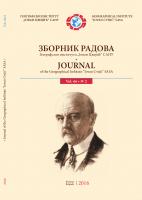Economic-Geographical Perspectives Of The Trade Relations Between Turkey And The Balkans
Economic-Geographical Perspectives Of The Trade Relations Between Turkey And The Balkans
Author(s): Jozef FeketeSubject(s): Economy, Geography, Regional studies, International relations/trade, Transformation Period (1990 - 2010), Present Times (2010 - today)
Published by: Географски институт »Јован Цвијић« САНУ
Keywords: economic dynamics; Turkey; the Balkans; foreign policy; trade;
Summary/Abstract: The aim of this paper is to consider whether there is an evolving regional economic integration (or disintegration) in Southeast Europe, which is based on the ethno-religious composition of the countries concerned. Namely, to analyse the evolving regional integration in Southeast Europe by evaluating foreign trade data. The main focus of this paper is on the case of Turkey, because after the Millennium the foreign policy of Turkey puts a higher emphasis on focusing on the states which had been parts of the former Ottoman Empire. It can be presumed that in the fields of social relations these countries have more fruitful economic relations as well. Jovan Cvijić in his ‘anthropogeographical’ research analysed the geographical influences on cultural dynamics and ethics, which still prevail. This present study attempts to explore the relations between the social factors and the economic matters by carrying out an analysis of product lines, their types, and market value in the period 2008–2014. The study suggests that despite the fact that the cultural ties of Turkey based on ethnicity and religion are tighter with Albania and the Federation of Bosnia and Herzegovina than with e.g. Serbia and Croatia, in a globally connected world, the market opportunities, the geographical distance, and the ability to pay for products and services matter more than historical and cultural relations. This is the reason why Turkey has profitable economic relations with Romania, Greece and Bulgaria.
Journal: Зборник радова Географског института "Јован Цвијић" САНУ
- Issue Year: 66/2016
- Issue No: 2
- Page Range: 307-324
- Page Count: 18
- Language: English

